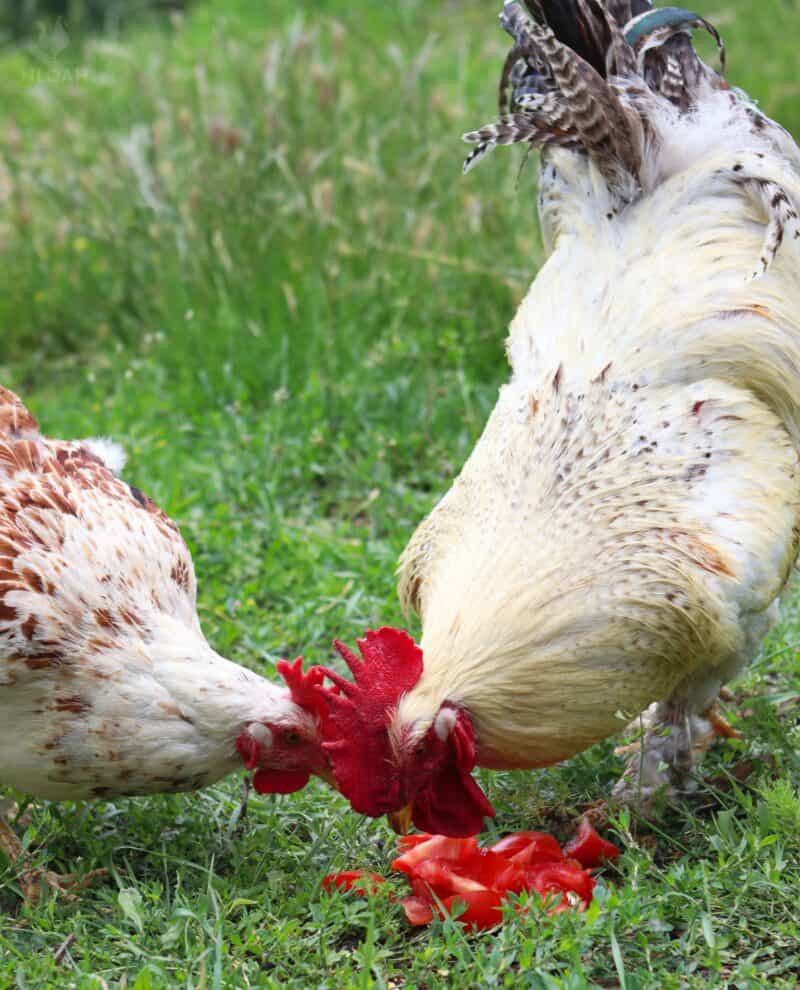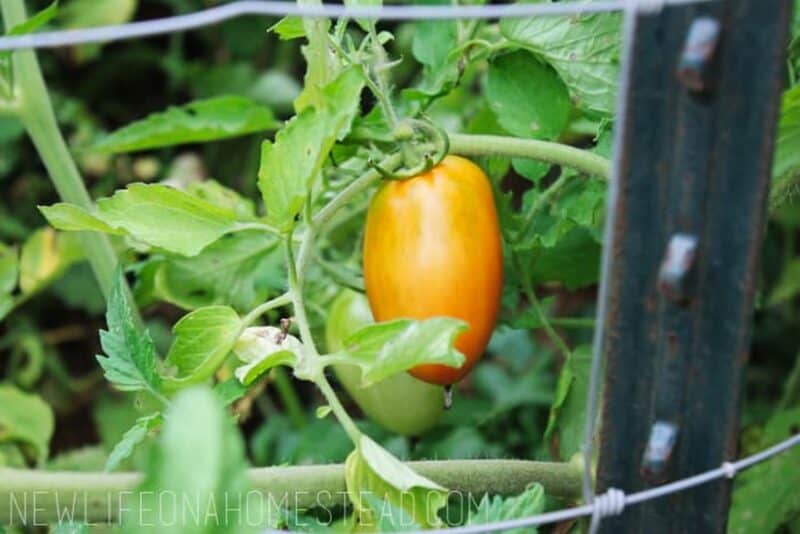Tomatoes are one of the most beloved, versatile, and common fruits enjoyed all over the world. Yes, they are fruits, not vegetables, I said it.
But we aren’t here to argue about semantics. We are here to find out if chickens can have tomatoes. So, can your chickens eat tomatoes?

Yes, chickens may eat ripe, red tomatoes, including the skin and seeds. However, all other parts of the tomato plant and unripe, green tomatoes contain dangerous amounts of solanine which can hurt or kill chickens.
Another member of the varied and wide-ranging nightshade family, tomatoes have many health benefits to recommend them, and that includes for your chickens.
But you’ll need to use caution and feed them sparingly if you want to make them a nutritious part of your flock’s diet.
Keep reading and we will tell you what you need to know.

Nutritional Profile of Tomatoes
Tomatoes are juicy and delicious, but far from being a common sandwich topping or critical ingredient in delicious sauces they also have a pretty solid nutritional profile.
Tomatoes have all kinds of vitamins, including plenty of vitamin A, beta carotene, vitamin C, vitamin E, vitamin K, and most of the B complex vitamins.
| 100g Tomatoes | Amount |
|---|---|
| Water | 94.52 g |
| Energy | 18 kcal |
| Protein | 0.88 g |
| Total lipid (fat) | 0.2 g |
| Carbohydrate, by difference | 3.89 g |
| Fiber, total dietary | 1.2 g |
| Sugars, total including NLEA | 2.63 g |
| Calcium, Ca | 10 mg |
| Iron, Fe | 0.27 mg |
| Magnesium, Mg | 11 mg |
| Phosphorus, P | 24 mg |
| Potassium, K | 237 mg |
| Sodium, Na | 5 mg |
| Zinc, Zn | 0.17 mg |
| Copper, Cu | 0.059 mg |
| Vitamin C | 13.7 mg |
| Thiamin | 0.037 mg |
| Riboflavin | 0.019 mg |
| Niacin | 0.594 mg |
| Vitamin B-6 | 0.08 mg |
| Folate, total | 15 µg |
| Folate, food | 15 µg |
| Folate, DFE | 15 µg |
| Choline, total | 6.7 mg |
| Vitamin A, RAE | 42 µg |
| Carotene, beta | 449 µg |
| Carotene, alpha | 101 µg |
| Lycopene | 2573 µg |
| Lutein + zeaxanthin | 123 µg |
| Vitamin E | 0.54 mg |
| Vitamin K | 7.9 µg |
They also have a fairly good mineral profile, with dependable amounts of manganese, potassium, magnesium, phosphorus, iron, zinc, and calcium.
Tomatoes are also one of the juiciest vegetables (actually fruits) around, averaging around 94% water by weight.
Health Benefits of Tomatoes for Chickens
Tomatoes have many health benefits for chickens. The antioxidants present in tomatoes help to reduce cancer risk and lower the risks of many other diseases.
The vitamins in tomatoes are beneficial for feathers, skin, and skeletal health.
Although tomatoes don’t seem that sweet compared to many other fruits, nonetheless they are quite sugary and can give your chickens a good burst of energy in the form of fructose and glucose, helping them to stay warm in a colder temperatures and reducing heat stress on hot days.
Speaking of hot weather, a juicy tomato combined with the potassium that it contains is it just the ticket for keeping birds hydrated and their electrolyte levels balanced, meaning tomatoes are one of the best treats you can offer them to help combat heat stress.
Can Chickens Eat Tomatoes Raw?
Yes, chickens may eat tomatoes raw so long as they are ripe and red.
Serving tomatoes raw is actually the best way to give them to your chickens since it will maintain the most nutritional benefits.
High heat to say nothing of lengthy cooking will degrade or destroy vitamins and minerals, reducing the health benefits somewhat.
Can Chickens Eat Tomato Seeds?
Yes, chickens can eat tomato seeds with complete safety so long as the tomato itself is ripe.
Can Chickens Eat Tomato Skins?
Yes, they can. The skins from ripe, red tomatoes are completely safe for chickens to eat, although their texture might turn off some birds.
If your chickens seem enthusiastic to eat the entirety of the tomato, skin, and all, you can let them without worry.
Can Chickens Eat Other Parts of the Tomato Plant?
No! All other parts of the tomato plant, including the stem, the vine, roots and all contain dangerous amounts of solanine, a toxin present in most members of the nightshade family.
Luckily, most chickens seem to instinctively avoid these parts of the plant, but eating even a small amount of any of them could spell disaster.
You must always keep your chickens away from any tomatoes that you are growing, and take care to remove any stems or leaves from store-bought tomatoes.
Can Chickens Eat Green Tomatoes?
No! Unripened, green tomatoes still contain toxic solanine as detailed above.
These solanine levels decrease as the tomato ripens and the skin, and flesh, turn red.
Never, ever feed green tomatoes to your chickens, and it never feed them any tomato which still has green spots or patches on it.
Can Chickens Eat Tomatoes Cooked?
Yes, chickens can eat tomatoes cooked with complete safety so long as you keep in mind that cooking generally concentrates the sugars found in the fruit.
As mentioned above, cooking also degrades the vitamins and minerals present which does lower the overall nutritional benefit somewhat.
Never Feed Tomatoes to Chickens that Have Been Prepared with Harmful Ingredients
Since we are on the subject of cooking, you must never feed tomatoes to your chickens that have been prepared with harmful ingredients, or anything harmful that uses tomatoes as an ingredient.
Things like salt, sugar, oil, butter, certain herbs and spices, and so forth are just not good for your chickens and may cause serious health problems.
If tomatoes are used in pasta sauce, pizza sauce, aspic, and things of that nature you need to save those for you and your family and avoid giving them to your birds.
At best, high-calorie ingredients and dishes will simply cause your birds to gain a lot of weight which can cause problems of its own.
But, at worst, your birds might suffer from salt poisoning, high blood pressure, or fatty liver syndrome but more likely sour crop or other conditions.
Beware of Pesticide on Grocery-bought Tomatoes
If you are purchasing tomatoes from the grocery store for the purpose of feeding them to your chickens, you must take the time to thoroughly wash them prior to serving.
Pretty much all commercial produce is heavily treated with pesticides and other chemicals prior to making it to the consumer, and even if this produce is washed ahead of time some residues always remain.
That means you must be diligent in preparing store-bought tomatoes by washing or even peeling them if you want to be sure you have removed as many of these residues as possible.
If you are in doubt, try to buy organic tomatoes or grow your own.
How Often Can Chickens Have Tomatoes?
Tomatoes are healthy and safe for chickens so long as they are ruby red and ripe, but they should still have them sparingly.
Tomatoes are fairly high in sugars, and chickens don’t need an awful lot of sugar in their diet.
Furthermore, chickens should be subsisting primarily on their chicken feed for about 90% of their total calorie intake.
The remaining 10% of their calorie intake should be made up of wholesome supplemental foods and treats, and tomatoes should be only a part of that 10%.
Preparing Tomatoes for Your Flock
It is pretty easy to serve tomatoes to your flock.
Make sure you remove any leaves, vines, or stems, and then all you’ll need to do is cut tomatoes in half or into quarters prior to placing them in a bowl or on a tray for your birds.
Tomatoes are so juicy they have a tendency to get nasty pretty quickly if you just throw them on the ground, so you can keep them in good shape for your flock by placing them as described above.
You might also consider refrigerating tomatoes immediately prior to serving them in order to cool them down, and make them even more appealing to your birds on a hot day.
Can Baby Chicks Have Tomatoes, Too?
Yes, chicks can have tomatoes, periodically, but you should wait until they are at least 6 weeks old before letting them have them for the first time.
Chicks have highly sensitive digestive tracts, under the juicy, tangy, sugary tomatoes could be just the thing to upset it and cause sour crop or diarrhea.
You don’t want your chicks dealing with either.
Accordingly, only try to give your chicks a few bites of tomato maybe once a week and keep an eye on them after serving to make sure that they handle it okay.
Make Sure You Clean Up After Serving Tomatoes to Your Flock
Always clean up any leftover pieces or scraps of tomato after serving them to your flock.
Tomatoes mold and decompose quickly, and any chicken that comes back around later to get a nibble could be made sick by spoiled tomatoes.
Tom has lived and worked on farms and homesteads from the Carolinas to Kentucky and beyond. He is passionate about helping people prepare for tough times by embracing lifestyles of self-sufficiency.
